Monica Alicea | Senior Associate | Guayaquil
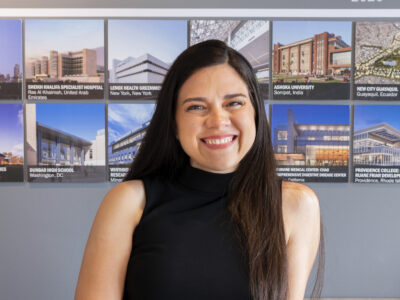 I was born and raised in Puerto Rico, an island in the Caribbean that is as beautiful as it is full of culture and tradition. I left 14 years ago to pursue graduate school, and subsequent circumstances would force me to make a career and a life away from home. As a part of the growing Puerto Rican diaspora, having now lived long periods in both New York and Guayaquil, I have struggled with fitting into cultures that sometimes felt familiar and sometimes alien to me.
I was born and raised in Puerto Rico, an island in the Caribbean that is as beautiful as it is full of culture and tradition. I left 14 years ago to pursue graduate school, and subsequent circumstances would force me to make a career and a life away from home. As a part of the growing Puerto Rican diaspora, having now lived long periods in both New York and Guayaquil, I have struggled with fitting into cultures that sometimes felt familiar and sometimes alien to me.
However, I have been exposed to people, places, and cultures that have brought me amazing food, language, accents, humor, and many other customs and traditions that I will always take with me.
Why are you interested in DE&I is issues?
As a child, I grew up with the feeling that my cultural identity was something to be protected as if someone wanted to take it away. That’s because I was born in a place that had historically been forcibly appropriated by others. Growing up on this cultural battleground has been a lifelong process of resistance that’s become more relevant each day as our people keep being displaced, and as we increasingly assimilate into the American culture.
I think each and every one of us has a story to tell, and we have experienced moments where we might have been discriminated against or felt uncomfortable with people assuming our gender or cultural identity. At the same time, we know we might possess privileges that others don’t. Openly discussing diversity and inclusion issues allows us to gain perspective about where we all come from, and we can become more empathetic with each other in the process.
Julia Bartmanska | Emerging Professional | Vancouver
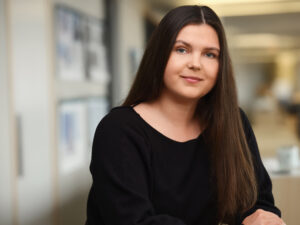 Born into a multicultural family with a Polish-Ukrainian-Lithuanian background, I was happily exposed to the history and traditions of those countries that I still keep deeply in my heart, and I definitely can’t live without pierogi!
Born into a multicultural family with a Polish-Ukrainian-Lithuanian background, I was happily exposed to the history and traditions of those countries that I still keep deeply in my heart, and I definitely can’t live without pierogi!
Growing up, most members of my family were always spread around the world, so travelling was not only our hobby but an intentional necessity that helped me to learn that no matter where people live, we are all connected in some way through love stories, comfort meals, and music. Later in life, curiosity and my childhood passion for exploring brought me to Vancouver, British Columbia, in Canada where I am currently enjoying the unique climate of the Pacific Ocean—and the culinary wonders of poutine.
In my free time, I’m trying to stop myself from buying or cultivating new baby plants. I love exploring hidden gems of the city, trying new food and strolling around Stanley Park, where somehow every time you can discover a new shade of sunset.
Why do you think DE&I is an important part of our practices?
As a Designer, I believe in the possibility of architecture and research combined to strengthen our community and improve the urban and architectural landscape. One architectural initiative I’ve always admired is a community outside Vienna, Austria, planned entirely by women architects in a collective called the Frauenburo (which literally translates to city women’s office). The project was meant to redesign a city to demonstrate how gender-sensitive design could be applied in practice. The goal was to make the daily life of women easier, to understand their everyday needs and patterns, and incorporate them into an urban network of Vienna. Since the 1990s, the project has given life to multiple additional initiatives, such as the renaming of the streets after women, improving housing standards to accommodate the needs of different female age groups, and creating a comfortable and safe living environment.
Yucel Guven | Associate | Los Angeles
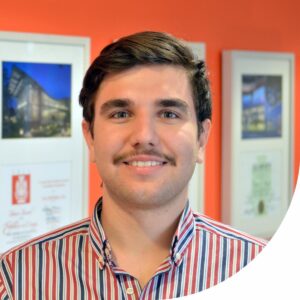 My name is Yücel. I’m originally from Turkey. I moved to the States almost 10 years ago for college and have been with Perkins Eastman in LA for the past five years. When I’m here, the thing I miss about Turkey is not places or food, but people, culture, and mindsets. Funnily enough, when I stay in Turkey longer than a few weeks, I miss the same thing about the US! I think the dichotomy is now ingrained in me and I really appreciate the differences. Besides, as someone who loves cooking as much as he does dining, I’m not one to shy away from trying to cook foods from back home if I miss them. Sometimes with bonus ingredients, I’ve picked up while living here that wouldn’t traditionally be in a recipe.
My name is Yücel. I’m originally from Turkey. I moved to the States almost 10 years ago for college and have been with Perkins Eastman in LA for the past five years. When I’m here, the thing I miss about Turkey is not places or food, but people, culture, and mindsets. Funnily enough, when I stay in Turkey longer than a few weeks, I miss the same thing about the US! I think the dichotomy is now ingrained in me and I really appreciate the differences. Besides, as someone who loves cooking as much as he does dining, I’m not one to shy away from trying to cook foods from back home if I miss them. Sometimes with bonus ingredients, I’ve picked up while living here that wouldn’t traditionally be in a recipe.
Why do you think DE&I is an important part of our practices?
When joining the LA studio, I was very excited by the diversity of my colleagues—everyone brought different perspectives stemming from their upbringing, culture, and life experience. Since then, I’ve been quite appreciative of how this diversity gets celebrated and every individual gets equal opportunities within the Perkins Eastman framework. If, as a designer, I can help craft buildings and spaces that allow for the same kind of inclusion that I get to enjoy in my work life, I will feel fulfilled in my career path.
My desire has always been to work on projects that many people get to experience. The best way to do that would be to make every one of those people feel welcome. As the discourse on DE&I evolves, I would like to be a part of it to learn what I can implement into my work.
Gordon Lee | Senior Associate | Dallas
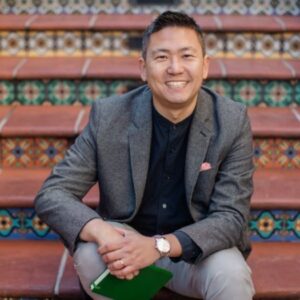 When things closed down during the pandemic, my favorite way to get out and explore was by visiting grocery stores in various communities—stores that stocked Korean, African, Vietnamese, Indian, and Japanese staples, to name a few. It was fascinating to peruse the different spices, ingredients, glassware, and silverware that linked to specific geographical areas and their weather, religions, and cultures. As a new immigrant from Taiwan, this experience enhanced my appreciation of the importance of diversity and equality.
When things closed down during the pandemic, my favorite way to get out and explore was by visiting grocery stores in various communities—stores that stocked Korean, African, Vietnamese, Indian, and Japanese staples, to name a few. It was fascinating to peruse the different spices, ingredients, glassware, and silverware that linked to specific geographical areas and their weather, religions, and cultures. As a new immigrant from Taiwan, this experience enhanced my appreciation of the importance of diversity and equality.
Why do you think DE&I is an important part of our practices?
The hospitality industry is all about experiential design and storytelling. It’s a shared belief that we can craft a better story around both staff and guests’ experiences when we truly understand our audience. When our team starts a new hotel on the other side of the world, diversity helps us integrate into the region. It is critical for our audience to embrace and anchor our vision.
Ahmed Zaman | Senior Associate | Washington, DC
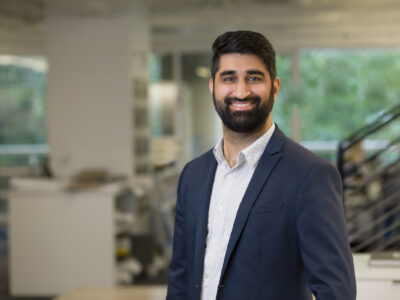 My parents immigrated to the US from Pakistan in the mid-1970s. We moved around quite a bit between New Jersey and New York, but eventually made our way to my hometown of Annapolis, MD. My cultural heritage is a strong part of my identity. Travel has always played a huge part of getting exposed to different cultures and experiences that have given me a holistic view of the world.
My parents immigrated to the US from Pakistan in the mid-1970s. We moved around quite a bit between New Jersey and New York, but eventually made our way to my hometown of Annapolis, MD. My cultural heritage is a strong part of my identity. Travel has always played a huge part of getting exposed to different cultures and experiences that have given me a holistic view of the world.
This has influenced my work at varying scales between domestic and global practice. I’ve always been a foodie, and I’m a wannabe chef to the point where my wife gifted me a chef’s coat that I put on from time to time when I’m cooking for family or friends.
Why are you interested in DE&I issues?
We often talk about how we want our firm to be a reflection of the society we serve – this is why I’m most keen on supporting our DE&I efforts across the firm. It’s about amplifying DE&I perspectives for a more equitable and just place to work, but also ensuring that we have a greater reach to our communities and creating a pipeline for future diverse generations to enter the practice. Ultimately, DE&I ties back to our Human By Design ethos.
